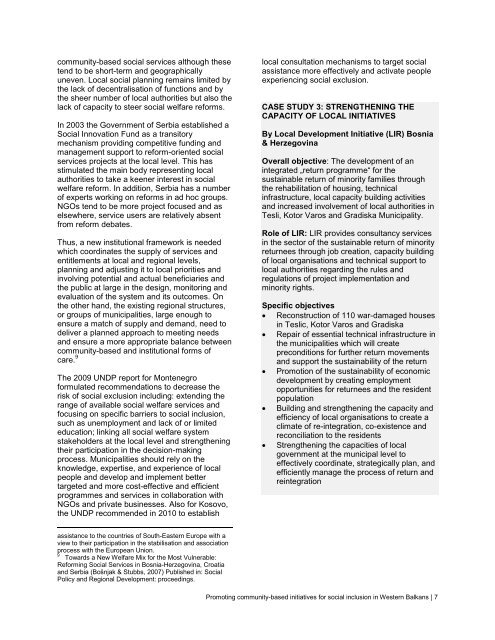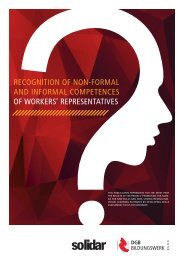Promoting community-based initiatives for social inclusion ... - Solidar
Promoting community-based initiatives for social inclusion ... - Solidar
Promoting community-based initiatives for social inclusion ... - Solidar
Create successful ePaper yourself
Turn your PDF publications into a flip-book with our unique Google optimized e-Paper software.
<strong>community</strong>-<strong>based</strong> <strong>social</strong> services although these<br />
tend to be short-term and geographically<br />
uneven. Local <strong>social</strong> planning remains limited by<br />
the lack of decentralisation of functions and by<br />
the sheer number of local authorities but also the<br />
lack of capacity to steer <strong>social</strong> welfare re<strong>for</strong>ms.<br />
In 2003 the Government of Serbia established a<br />
Social Innovation Fund as a transitory<br />
mechanism providing competitive funding and<br />
management support to re<strong>for</strong>m-oriented <strong>social</strong><br />
services projects at the local level. This has<br />
stimulated the main body representing local<br />
authorities to take a keener interest in <strong>social</strong><br />
welfare re<strong>for</strong>m. In addition, Serbia has a number<br />
of experts working on re<strong>for</strong>ms in ad hoc groups.<br />
NGOs tend to be more project focused and as<br />
elsewhere, service users are relatively absent<br />
from re<strong>for</strong>m debates.<br />
Thus, a new institutional framework is needed<br />
which coordinates the supply of services and<br />
entitlements at local and regional levels,<br />
planning and adjusting it to local priorities and<br />
involving potential and actual beneficiaries and<br />
the public at large in the design, monitoring and<br />
evaluation of the system and its outcomes. On<br />
the other hand, the existing regional structures,<br />
or groups of municipalities, large enough to<br />
ensure a match of supply and demand, need to<br />
deliver a planned approach to meeting needs<br />
and ensure a more appropriate balance between<br />
<strong>community</strong>-<strong>based</strong> and institutional <strong>for</strong>ms of<br />
care. 9<br />
The 2009 UNDP report <strong>for</strong> Montenegro<br />
<strong>for</strong>mulated recommendations to decrease the<br />
risk of <strong>social</strong> exclusion including: extending the<br />
range of available <strong>social</strong> welfare services and<br />
focusing on specific barriers to <strong>social</strong> <strong>inclusion</strong>,<br />
such as unemployment and lack of or limited<br />
education; linking all <strong>social</strong> welfare system<br />
stakeholders at the local level and strengthening<br />
their participation in the decision-making<br />
process. Municipalities should rely on the<br />
knowledge, expertise, and experience of local<br />
people and develop and implement better<br />
targeted and more cost-effective and efficient<br />
programmes and services in collaboration with<br />
NGOs and private businesses. Also <strong>for</strong> Kosovo,<br />
the UNDP recommended in 2010 to establish<br />
local consultation mechanisms to target <strong>social</strong><br />
assistance more effectively and activate people<br />
experiencing <strong>social</strong> exclusion.<br />
CASE STUDY 3: STRENGTHENING THE<br />
CAPACITY OF LOCAL INITIATIVES<br />
By Local Development Initiative (LIR) Bosnia<br />
& Herzegovina<br />
Overall objective: The development of an<br />
integrated „return programme“ <strong>for</strong> the<br />
sustainable return of minority families through<br />
the rehabilitation of housing, technical<br />
infrastructure, local capacity building activities<br />
and increased involvement of local authorities in<br />
Tesli, Kotor Varos and Gradiska Municipality.<br />
Role of LIR: LIR provides consultancy services<br />
in the sector of the sustainable return of minority<br />
returnees through job creation, capacity building<br />
of local organisations and technical support to<br />
local authorities regarding the rules and<br />
regulations of project implementation and<br />
minority rights.<br />
Specific objectives<br />
Reconstruction of 110 war-damaged houses<br />
in Teslic, Kotor Varos and Gradiska<br />
Repair of essential technical infrastructure in<br />
the municipalities which will create<br />
preconditions <strong>for</strong> further return movements<br />
and support the sustainability of the return<br />
Promotion of the sustainability of economic<br />
development by creating employment<br />
opportunities <strong>for</strong> returnees and the resident<br />
population<br />
Building and strengthening the capacity and<br />
efficiency of local organisations to create a<br />
climate of re-integration, co-existence and<br />
reconciliation to the residents<br />
Strengthening the capacities of local<br />
government at the municipal level to<br />
effectively coordinate, strategically plan, and<br />
efficiently manage the process of return and<br />
reintegration<br />
assistance to the countries of South-Eastern Europe with a<br />
view to their participation in the stabilisation and association<br />
process with the European Union.<br />
9<br />
Towards a New Welfare Mix <strong>for</strong> the Most Vulnerable:<br />
Re<strong>for</strong>ming Social Services in Bosnia-Herzegovina, Croatia<br />
and Serbia (Bošnjak & Stubbs, 2007) Published in: Social<br />
Policy and Regional Development: proceedings.<br />
<strong>Promoting</strong> <strong>community</strong>-<strong>based</strong> <strong>initiatives</strong> <strong>for</strong> <strong>social</strong> <strong>inclusion</strong> in Western Balkans | 7
















